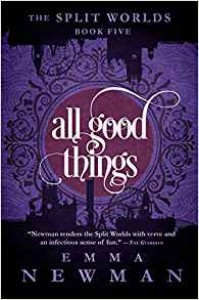

I a stalwart fan of Emma Newman through her powerful work, Planetside. Although the tone and plot of the Split Worlds series are very different, I loved them all, devouring the previous four books in less than one week. After waiting for the final book for almost a year, I found it a satisfying conclusion to the series. As with the previous books in the series, All Good Things deals heavily with themes of feminism, environmentalism, agency, and responsibility.
This book is the completion of a long story arc, and I don't believe it should be read without the rest of the series. All of the characters from previous books have returned. As always, I wasn't quite sure if I actually liked Cathy, the major protagonist of the series and the is the driving force of the story. Cathy is a fierce feminist who wants to bring change to the changeless Nether world, but to me it feels like she is driven by a selfish, myopic ideology that often stops her from seeing the harm her actions inflict on others. This selfishness is examined in the novel: Cathy seeks to bring dramatic change, and this is bound to have negative impacts on others. What right does she have to make these types of decisions for so many others? As one character puts it:
"To create change, to disrupt a system of control, one must carry out radcal acts. One must be prepared to destroy so that something new can be created. Those in control will never give up the power afforded to them voluntarily. It must be taken. If that requires the deaths of a few to give freedom to the many-- and survival of the many--then so be it. This is not a gentle act."
But who has the right to decide to make that sacrifice? Does having the power to carry out the act give you the right to do so?
Fortunately, the other characters-- Sam, Lucy, Kay, and the gargoyle -- are more sympathetic. However, there's a big "anyone can die" and "anyone can betray" vibe in the novel. There is no easy division into protagonists and antagonists in the novel: everyone is driven by their own motivations and secret loyalties. Because of this, there have been many different antagonists in the story, with protagonists easily morphing into enemies. Sometimes, the changes felt too facile to me, the deaths of characters too superficial, the betrayals too unrooted. I particularly disliked how anticlimactic some of the dismissals of characters we've grown to care about throughout the series were, and how easily the characters were forgotten and set aside.
(show spoiler)At the same time, I loved some of the twists of All Good Things: one of my favourite aspects of the book is how antagonists morph into allies and how an abrupt twist brought the one true villain of the series into sharp relief.
At its core, the novel is all about control and ownership and responsibility, and however surprising the ending, I found All Good Things a satisfying end to the series. If you've read the other Split Worlds books, I don't need to tell you about this book because you're going to read it anyway. As for me, I can't wait to see what Emma Newman has in store for her readers next.
~~I received an advanced reader copy of this ebook through Netgalley from the publisher, Diversion Books, in exchange for my honest review.~~
Cross-posted on Goodreads.





